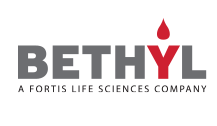Rabbit anti-eIF4H IHC Antibody Affinity Purified

Product Details
Specifications
The epitope recognized by IHC-00609 maps to a region between residue 198 and 248 of human eukaryotic translation initiation factor 4H using the numbering given in entry NP_071496.1 (GeneID 7458).
Immunoglobulin concentration was determined using Beer’s Law where 1mg/mL IgG has an A280 of 1.4. Antibody was affinity purified using an epitope specific to eIF4H immobilized on solid support.
The epitope recognized by IHC-00609-T maps to a region between residue 198 and 248 of human eukaryotic translation initiation factor 4H using the numbering given in entry NP_071496.1 (GeneID 7458).
Immunoglobulin concentration was determined using Beer’s Law where 1mg/mL IgG has an A280 of 1.4.
Additional Product Information
eIF4H (eukaryotic translation initiation factor 4H) plays a role in modulating the RNA helicase activity of eIF4A for the initiation of translation. Haploinsufficiency of the EIF4H gene may be involved in the rare developmental disorder, Williams-Beuren syndrome (WBS).
Alternate Names
eIF-4H; eukaryotic translation initiation factor 4H; WBSCR1; Williams-Beuren syndrome chromosomal region 1 protein; Williams-Beuren syndrome chromosome region 1; WSCR1
Applications
Epitope exposure is recommended.
Epitope exposure with citrate buffer will enhance staining.
Likely to work with frozen sections.
In some cases, the antibody may be diluted further than indicated.
